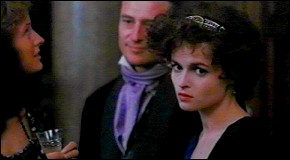![[Deep Focus]](../../flicker/logo.gif) |
|
|
THE WINGS OF THE DOVE | |
 |
GRADE: B+ |
|
There's a simple, lyrical beauty to The Wings of the Dove that's gone missing from too many films lately. It has to do with the film's eye for locations in London and in Venice, with its sure-footed re-creation of life in the years just past the turning of the 20th Century. It's embodied in characters that are drawn neither too finely nor with too broad a stroke, and with an intricate emotional pas de trois that's delicately executed by a fine trio of actors. Finally, it may be best exemplified by the delicate purple tinge that colors much of the film's geography, a smooth visual rhyme for the bluer-than-blue wardrobe of the ever-bewitching Helena Bonham Carter. The first scenes are fairly bursting with impropriety. The impeccable Kate Croy (Bonham Carter), bundled up as though expecting a snow storm, is clearly slumming when she rides the packed London subway. The earnest Merton Densher (Linus Roache) offers her his seat, almost ritualistically. After the train lets out at a crowded station, the two find themselves on board an elevator, grabbing, groping, and kissing as though floodgates have been opened somewhere. Indeed they have. Kate is perched between two centuries. She's in love with Merton, an idealistic young journalist. But she's in thrall to her wealthy Aunt Maude (Charlotte Rampling, whose presence is as welcome as ever), who expects her to marry at her proper station. The turn of the century being what it is, Kate's impulse is to deny the destiny prescribed for her, to seize her own life by marrying Merton despite the commandment of her benefactor. But it is apparently not to be, for Maude holds over Kate's head not only her own well-being, but the well-being of her father (Michael Gambon), who Kate learns is equally reliant on Maude's monetary graces. Tugged this way and that by proper society and her own intransigent emotions, Kate refuses to succumb to Maude's wishes. After she meets Millie Theale (Alison Elliott of last year's The Spitifre Grill), an American visitor with financial resources to spare, she finally devises a plan that may allow her to stay with Merton forever. The only catch is that Merton must be her willing accomplice, and the poor man is understandingly reluctant. The way this emotional shell game plays out, and its ramifications for all of the parties involved, is the subject of the film. Director Iain Softley, who showed some stuff with the fictional Beatles biopic Backbeat and then stumbled with the well-intentioned Hackers, sets certain parameters for his film and then maneuvers beautifully within its limitations. As cinema, it's not a showpiece, although it is lovingly shot by Eduardo Serra (who photographed the equally beautiful Jude for Michael Winterbottom last year) and deftly edited by Tariq Anwar (The Crucible). As storytelling, it's relatively restrained, with much credit due to the screenplay by Hossein Amini (who also worked on Jude). I was struck most of all by how curious I was about each character's motivation -- most importantly, I wanted to know how they were feeling. This says a lot about the talents of the performers, and the wisdom of the director in giving them space to move. The film's shortcomings are the shortcomings of many a period drama -- some sequences flag, others seem a little precious, cliched, or indulgent. At certain moments, the film isn't as involving as it needs to be, and it suffers by letting our attention lapse. There is, however, one moment that must be heartbreaking to all but the stoniest of viewers -- I'm thinking of Merton at Millie's bedside, and her words to him that break him down in tears. Even so, Elliott is perhaps miscast. The essential joie de vivre that the others see in her isn't evident on the screen, although she's a sweet enough character. Speaking of casting, Bonham Carter is the film's main attraction, and she performs admirably as a woman whose nuanced desperation diverts our attention from her chilly scheming, and actually commands our sympathy. The Wings of the Dove has attracted much press attention by undressing Bonham Carter in the final reel, underscoring her vulnerability at a key moment with her lover. Whatever function it serves -- and she does look terrific -- this stops the film cold. If it makes a weird kind of narrative sense, it's also distracting in this context. The scene plays like a punishment -- she removes her clothing almost mournfully, as though performing penance for her misdeeds. If Bonham Carter's nudity is employed as a literal metaphor for emotional nakedness, Softley needn't have asked it of her. Here, as elsewhere in the picture, hers is the very face of sadness. | |
|
Directed by Iain Softley Screenplay by Hossein Amini Based on the novel by Henry James Cinematography by Eduardo Serra Edited by Tariq Anwar Starring Helena Bonham Carter, Linus Roache, and Alison Elliott U.K., 1997
| |

| |
 http://www.deep-focus.com/dfweblog/
bryant@deep-focus.com
http://www.deep-focus.com/dfweblog/
bryant@deep-focus.com